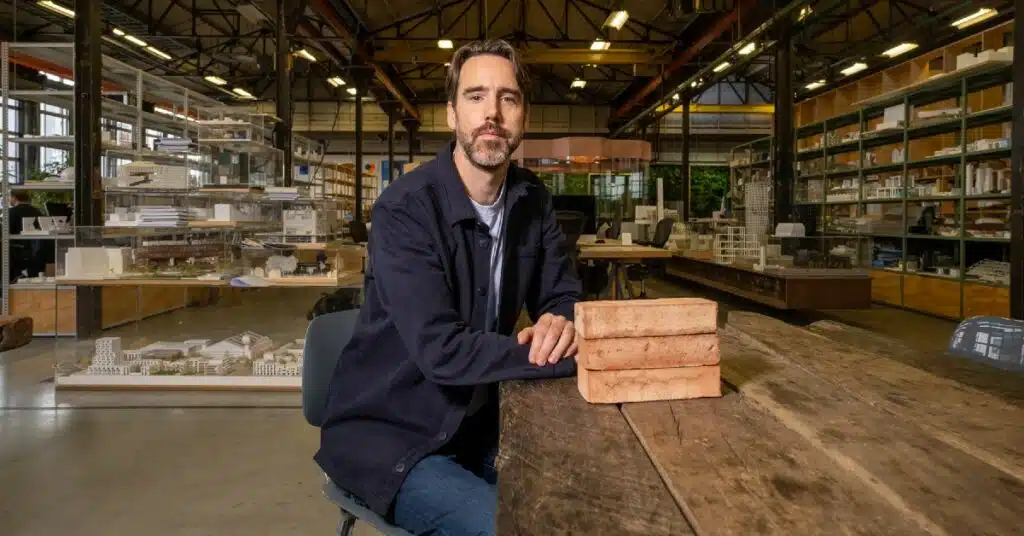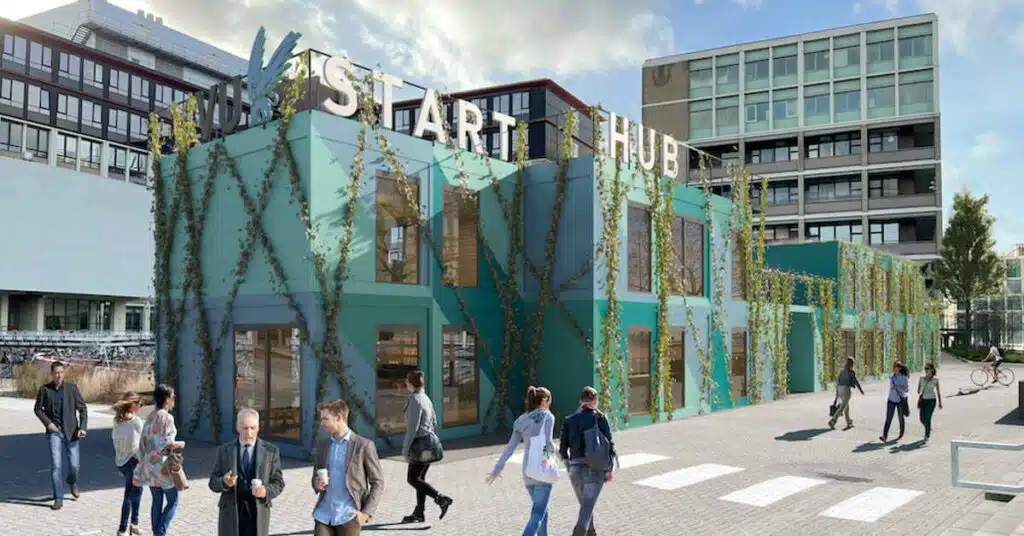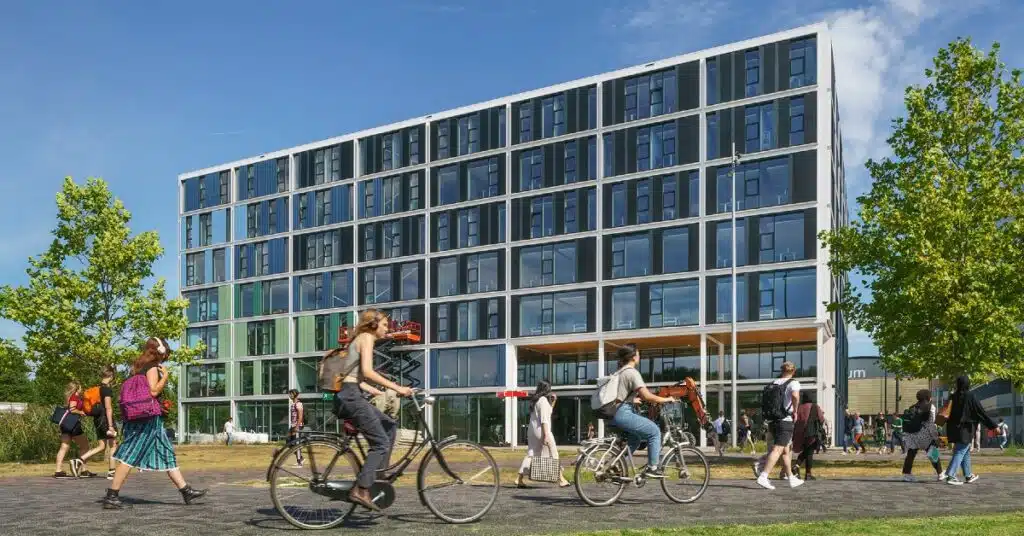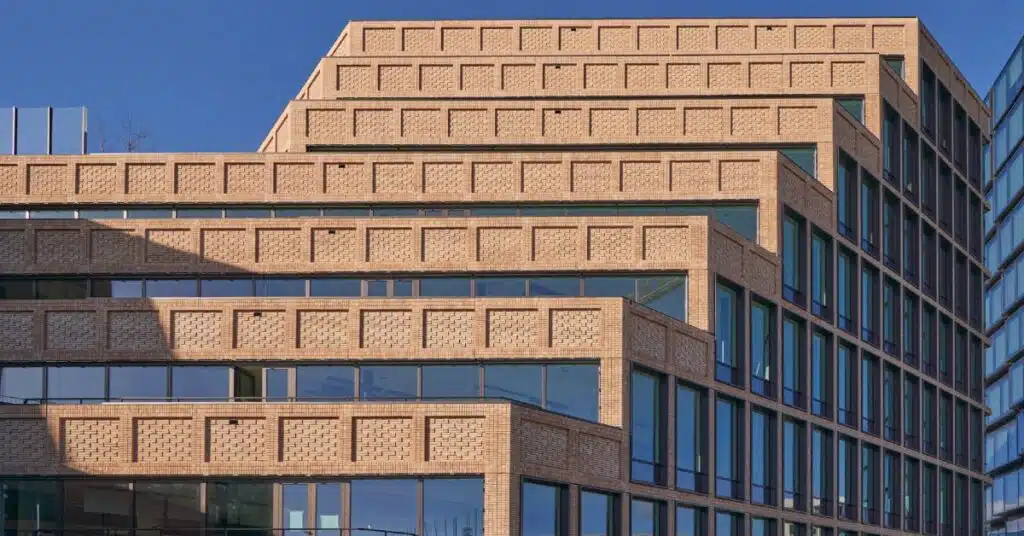On October 6, 2022, Vrije Universiteit Amsterdam opened doors to VU StartHub, a hotspot for campus startups.
The opening came a few weeks after the University of Amsterdam opened LAB42, a talent hub bringing education, research, and enterprise together.
“I wish I would have been in a space like this during my university time,” Constantijn Van Oranje-Nassau, special envoy at Techleap.nl, said at the opening of LAB42.
Apart from being located in university campuses, the common denominator between LAB42 and VU StartHub is that they are both built with sustainability in mind.
These are not just any other buildings but they stand as a symbol of sustainable construction and development in Amsterdam.
Sustainable Construction in Amsterdam

We are at the precipice where natural resources are depleting, the world is warming at an alarming rate, and there is a need for all traditional industries to limit their CO2 emissions.
One traditional industry taking steps towards sustainability is construction and it is happening in Amsterdam.
In Europe, the construction industry is responsible for one-third of all CO2 emissions and approximately 35 per cent of all waste generated.
These stats are among the first things you will see on the website of StoneCycling, an Amsterdam-based startup advancing use of upcycled waste and sustainable materials in construction.
“Amsterdam is definitely an early adopter when it comes to sustainable construction,” says Ward Massa, co-founder and CEO of StoneCycling.
Ward attributes this transformation to the fact that both architects and developers in the city are embracing sustainable construction.
He adds that the municipality of Amsterdam is also pushing the idea further by “implementing new tender requirements that push the use of sustainable materials.”
For those following the city of Amsterdam, this should not come as a surprise. The Dutch capital has consistently been at the forefront of embracing new ideas and adopting new technologies.
It is now the hotspot for testing circular and doughnut economy and is also where AI is being rapidly deployed to improve accessibility.
The City of Amsterdam aims to become a completely emission-free city by 2030 with the goal of becoming fully circular by 2050.
If the construction industry develops buildings with reusable materials and absorbs more CO2 than it takes to create them then the goal would be easier to achieve.
Sustainable buildings as fast solution

Marcel van Heemert, Program Manager at VU StartHub, says the city of Amsterdam is also able to deliver fast housing solutions with its sustainable development strategy.
“There are a lot of examples in Amsterdam where developers and the city used container/modular units as a beginning of new development,” says Marcel.
For more permanent buildings, Amsterdam is now increasingly using prefab housing projects.
According to Marcel, this shift helps “not only student housing but also as a fast solution for housing shortages for workers in the city.”
This solution also forms the backbone of VU StartHub’s sustainability roots. From the start, the new startup hub was envisioned to use refurbished construction units.
“We strongly believe refurbishable units are important in the future,” says Hans Drenth, Director of VU StartHub.
The LAB42, on the other hand, uses 100 per cent reusable steel structure as a rack, which makes it adaptable and reconfigurable for future changes.
With reused wooden laminated beams, recycled concrete work floor, recycled cable ducts, fire hose reels, and connection cables, LAB42 is circular and will produce as much energy as it needs with solar panels installed on the roof and in the facades.
A challenging path to sustainability

For both LAB42 and VU StartHub, the road to sustainability was not easy but they offer lessons on detachability, modular design, and prefabrication.
Siddique Sheikh, Business Developer at LAB42, says “Circularity was new for University of Amsterdam in 2018, the year they started building LAB42.”
“It requires a different way of thinking,” he says, adding, “This also applies to energy neutrality.”
Hans says their challenge largely stemmed from being in the middle of a crisis exacerbated by Russia’s war on Ukraine, which impacted availability of steel, parts, and other resources.
As a result, they had to make decisions weighing delivery time against sustainability requirements.
“We had to choose ‘dumb’ light luminaires instead of smart ones, so now we cannot make our building as smart as we would have wanted to,” explains Hans.
However, they did not compromise on their goal of refurbishable units and a reconstructable building leading to a sustainable and circular structure.
Siddique adds that they made sustainability possible with LAB42 by thinking about it not only in terms of costs but also in terms of societal value.
Incentives vs Initiatives

Willem Böttger, Director of R&D at NPSP, finds carbon-intensive materials to still be prominent in the construction industry in Amsterdam and the Netherlands.
He says, “Material prices in the building process are still relatively low.”
Even though there are alternative materials in the form of waste based bricks from Stonecycling and bio-based and circular materials advanced by NPSP, there is little incentive for the construction industry to adopt them.
“Challenge is that there is no pressure yet, or incentive to use biobased and circular materials,” says Willem.
Like with most challenges facing Amsterdam-based impact industry, investment remains lower than needed.
As developer, seller, and pilot producer of biobased and circular materials for the built environment, NPSP has shown it is possible to develop alternative materials for the construction industry.
However, Willem finds the business case to be wobbly and foresees “biobased materials will be supported economically in the near future.”
“There’s definitely the willingness to do things differently,” StoneCycling co-founder Ward tells Silicon Canals.
He sees adoption of sustainable construction and development as trial and error in Amsterdam but calls the city “increasingly better in doing things.”
“This works very well because there’s a big difference between plans and actual realisation,” he says.
Like Willem, Ward also believes that “economic incentives for sustainable development or strict regulations” will be the most effective way to bring about change.
Willem Böttger says the dutch government is planning to build one million new homes in the next ten years, there will be increased demand for material consumption.
A regulation or incentive-based development to adopt biobased materials or waste based bricks could pave the way for sustainability becoming the cornerstone of these new homes.
With its circular tendering, the municipality of Amsterdam has already shown its intent to set high standards for sustainability and architecture.
CROSSOVER, a sub-area located on the east side of the Zuidas along Europaboulevard set to be completed in 2023, will fundamentally transform the idea of sustainable construction in Amsterdam.
With examples like Vu StartHub and LAB42, the groundwork for sustainable construction is already laid and projects like the CROSSOVER are furthering the mission but it is now up to the city to make this transformation permanent.










01
From telecom veteran to Dutch Startup Visa success: The Jignesh Dave story